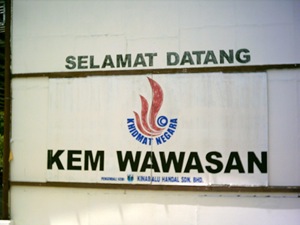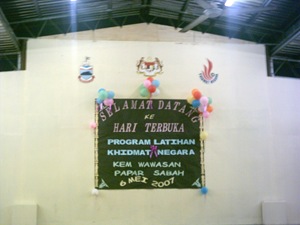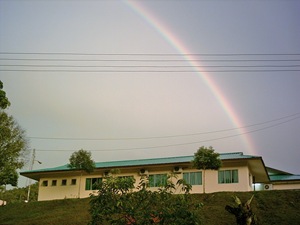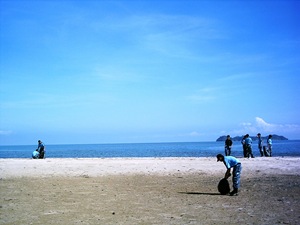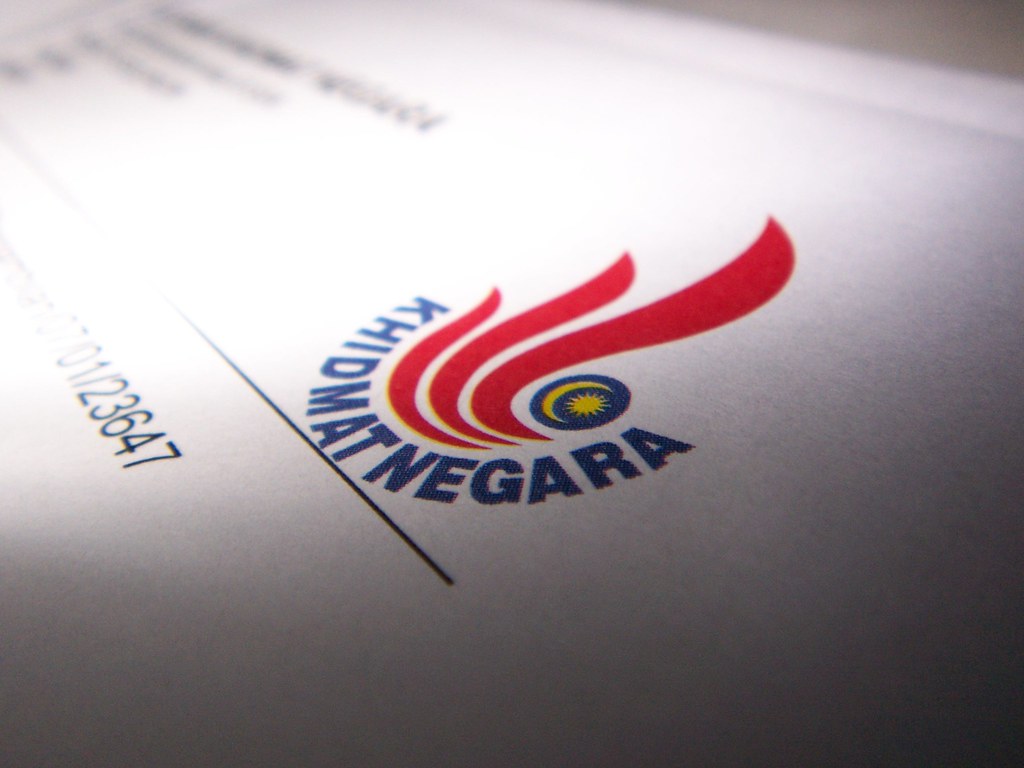How was the food? Was there enough for everyone?
I get this question all this time - seems like the quality of food there is a major concern on the mind of most Malaysians!
First off, let's discuss the quantity of food available.
As you may have surmised, we were fed 6 times a day. Breakfast, morning tea, lunch, evening tea, dinner, and a light supper of sorts at around 10.30 pm. For breakfast, there would be stacks of fluffy white bread, slabs of margarine and containers of kaya and strawberry jam and even peanut butter, if I remember correctly. There would be hard boiled eggs and kicap manis. There would also be heavier dishes for those who like a hearty breakfast - sometimes there would be fried kuey teow, nasi lemak, roti canai, porridge, and a few other varieties that would differ and rotate from day to day. For the heavier meals like lunch and dinner, there would be rice and an assortment of dishes like curries, fried stuff, and vegetables and there would always be fruit at the end of every meal. I remember us getting bananas, apples, oranges and the juicy pears that everybody loved. For the teatimes, there would be sweet, hot tea and little snacks or local kuih like currypuffs and even bubur chacha.
It could be said that the food was abundant - only the time to eat it was lacking. There were never any limits - for instance, if you liked the pears and wanted to bring some back to your dorm, by all means load some onto your plate. The girls always ate less than the boys, and boys being boys, their share of food on their side of the canteen would be finished first. If most of the girls had taken their share (it was a buffet style dining concept) and there was lots left on our side, the boys were more than welcome to take second or even third helpings.
Sounds great, you say! Looks like there's enough to go around for everyone! That's very true, but let's look at the quality of the food.
The food might not suit certain palates and tastebuds - I know some people who rarely ate at the canteen and chose to survive on snack food and fast food available at the cafe (a very popular hangout spot - the equivalent of a Starbucks in any major shopping mall) and a burger stall which was also near our dorms. Some deemed the food provided too oily, others too spicy, while some were just picky eaters. Some only appear at the canteen when there's nice food on the menu, like an English breakfast with baked beans and sausages, or a barbecue dinner with succulent lamb cutlets and coleslaw.
It really depends on how selective you are with what you eat, what sort of a budget you had, and what you deem edible. To me, everything was edible...nothing would outright kill you. Besides, it's National Service, not a gourmet festival! Those who came from less fortunate backgrounds wouldn't bother paying extra money for a burger when they could get their meals at the canteen for free. Those who didn't like the food and could afford it, chose to pay to get something else to eat.
What about the vegetarians, you ask? Well, the management at my camp was very attentive. They provided good food for the vegetarians and there would always be a special corner where vegetarian food was served, like dhall and sambal tofu and an assortment of vegetables. Personally, I thought very highly of them for catering to their needs without fail.
So there you have it - don't worry about going hungry or starving at NS!
Hmm, your schedule sounds very packed. What did you do for fun?
I have to say that for the first batch of any NS intake (the ones in January), the schedule is VERY hectic and the activities are spaced rather closely to one another. Why so?
See, the first batch gets the MOST holidays of ANY intake. We get breaks for Chinese New Year, the odd day off here and there, and according to my estimation, I actually served only two and a half months, not three! Therefore, to make sure we had as thorough an experience as other batches, our schedule was decidedly more packed.
The activities themselves were fun most of the time, but during the weekends where we get our handphones back (YAY!), most decide to catch up with their family and friends. See, it's much better to 'gayut' or talk endlessly on your handphone as opposed to yakking away on the public phone while a long queue grows behind you. Others choose to read, play board games or just chill out with their friends.
There was also a TV in the canteen where you could catch up on whatever RTM and TV3 were offering - of course, there was no Astro. You could also hang out at the cafe and chat over a cup of coffee.
How about your religious needs? There's a surau for the Muslims, but what about those of other faiths?
When it came to religion, as far as I know there was never a problem in my camp. The management was always very accommodating. Buddhists would be brought to a nearby temple, Hindus to another temple, and Punjabis would be brought all the way to Seremban (my camp's in PD) so that they could pray at their Gudhwara.
Let me relate to you a personal experience. I'm a Christian, and there weren't many of us in camp. At first, our trainers brought us to a church where the sermon or the prayer meeting was conducted in Mandarin. Problem is, most of us couldn't understand much Mandarin, we were 'bananas' so to speak. So we told our trainers the problem, and the weekend after that, they drove around with us in the van until we found a church where the service was conducted in English! I for one really appreciated the fact that they understood our problem and took the trouble to accommodate our request.
Hmm, NS sounds pretty bearable so far. Surely there were some downs?
Of course there were some less than pleasant parts...but they weren't horrible enough to ruin my entire experience.
For instance, I didn't really agree with the whole 'One person slips up, everyone gets punished' rule. It didn't strike me as fair, and being a Corporal or one of the trainees that were granted ranks, you get scolded before the trainees in your company get their share of the tongue lashing. However, I learned that this proved to be a somewhat effective measure - the jokers and the less disciplined lot, while loving the attention they get when they goof off, learned that others didn't appreciate doing push ups or extra marching as punishment for their deeds. To avoid being disliked by their peers, they learned to behave.
There were also times when everyone got yelled at for the mistakes of only a few. I remember when we were all decked out in our traditional best for a cultural night, when we were punished just because a few people had broken some rules. Imagine girls in baju kurungs and kebayas and guys in baju melayu and kurtas, looking all nice and elegant, having to do push ups. Looking back, it must have been quite a comical sight!
There was also a foul black pool beneath the monkey bars - those unable to make it across would fall into the nasty stagnant water and clamber out smelling like dead fish. Needless to say, most of us had a dip in it as pretty much everyone was useless at monkey bars. However, with the ironically named 'Kolam 100 Bunga' or 'Pond of Fragrant Flowers' (there were many names, but I only remember that particular one) beneath our swinging feet and straining arms, many of us learned. Fast.
Also, there were supernatural sightings, which occurs in almost all camps really. Some on night duty reported unusual coldness at certain part of the camps, while others swore they heard boots clomping on the roof of some dorms.
For those who dislike physical labour like mopping or cleaning out the bathroom, NS will be difficult as we have gotong royongs quite often where everyone is expected to pitch in. Those who are handphone dependent or Internet addicts will also find themselves restless and feel 'cut off' from the world.
Last, but not least, apart from my friends and family back home - I missed my washing machine very much. Remember people, the TV you can do without, while a washing machine really saves you a lot of time and effort! We did have a laundry service that washed our class clothes, sports clothes and famous 'blue zebra' uniforms, but this was tricky - if you don't time your laundry correctly, you'd have to wait for the laundry truck to come, quickly haul the big heavy laundry bag into the dorm and quickly find the uniform set you need! This happens sometimes when people forget to send out one set of uniform for washing yesterday, wear a nice clean set today, then realise they don't have a set for tomorrow!
What were the parts of NS that you truly enjoyed?
Now that you know most of the basics of NS, let me remind you of the good that makes me recall it with fondness.
My trainers were very sporting. Sometimes, when we have packed lunches in the bus on the way back from community service trips, we'd ask them to let us have a picnic of sorts, to let us eat at the beach. When we weren't hard pressed for time, they would agree and join us for lunch, and we'd scamper off to the beach happily, find a nice picnic table, distribute the packets of food and eat together with the wind in our hair, the sea right before our eyes and golden sand beneath our feet.
Sometimes, the female trainers would join us girls for a giggly gossip session at night, just joining us in our dorms in their pajamas and bringing along their bolster, and it would be SUCH fun to hear about previous batches, how much naughtier our batch is even though the ones before were no angels, share snacks and laugh and talk into the wee hours of the night. The trainers were still authority figures, but more importantly, they became our friends.
I really, really enjoyed the Community Service module - there were many activities, but I remember helping to clean out the Balai Raya of a village together with my friends, walking from door to door in another kampung to talk about the dangers of Dengue fever and handing out pamphlets so that the kampung folk would be reminded of how to prevent the Aedes mosquito from breeding.
I got to meet people from all walks of life, from all sorts of backgrounds. There were extremely rich people, and extremely poor people whose parents could not afford to visit them. There were those hoping to enter university and talking of education plans after SPM, while others spoke of returning to jobs as a factory worker or as a salesgirl. I got to know the person behind the stereotype - a Minah Rempit or a female illegal racer, who really was quite sweet and had a wicked sense of humour, and scars on her knuckles as a testament to the accidents she got into. A boyish girl who got into trouble for her penchant for the fairer sex, but was really a very down to earth person who only got defensive and abrupt when people questioned her sexual orientation.
The numerous inter company competitions were fun and fostered a healthy sense of competition as well as a loyalty to one's company. Alpha, Bravo, Charlie, Delta. We all had our own company songs, cheers and flags, which we had to guard zealously. If any company lost their flag i.e. left it unattended and let a trainer take it, the entire company would be punished. We were all fiercely competitive, striving to be the best in any activity, be it water rafting or jungle trekking.
We got to see some cool things, like a huge weaponry and army vehicle exhibition. I remember looking at the gleaming barrel of a machine gun on display, and watching another soldier demonstrate how a rifle is properly held. One of the best memories I have is actually being inside an armoured tank, and emerging from the top together with two other friends, laughing exultantly in the sun as we waved to our friends and the trainees from other camps while the tank rumbled around in a big circle. This was an honour and a privilege available only to a few due to time constraints, and those with ranks were given a chance to ride in the tank - a chance which I will always cherish.
Others had a chance to be on a ship at a naval base, which must have been awesome. I got to see JPA RELA members scaling down a tall tower in a jaw dropping display of skill and bravery as they demonstrated a rescue attempt for civilians trapped in burning buildings or those unable to make it to safety. I got to see the inside of a fully equipped ambulance, the fireproof gear of firemen and the tools they use. I trekked through the jungle with my company behind me, each of us holding on to one another's belt in a demonstration of faith. I had a parang in one hand, and the only lantern we had in another, while another one of rank navigated our way through the leafy darkness with a compass.
We battled the choppy currents of the sea as we rowed our rafts, yelling out a count in unison to help us glide through the waters. We did the camp's signature 'Chicken Dance' totally unabashed, enjoying ourselves en masse as our trainers turned up the song on the radio. We slept beneath the stars, waded through mud, frolicked in the sea, clomped through swampy marshes in jungles, built glorious bonfires that kept away wild animals, were scared off by hundreds of fire ants, but helped each other set up camp in a different location.
Sometimes we got into arguments, sometimes a company declared another company to be their rival for the champion's cup, and sometimes our competitiveness got the better of us, but on the last day, we all cried like babies as we waved goodbye to our friends. I remember super macho guys weeping quietly as they hugged their good friends tightly, girls taking pictures together with puffy red eyes and half-happy-half-sad smiles, people exchanging handphone numbers and e-mail numbers at the very last minute. I remember looking up at a bus, with a boy gesturing the universal 'call me' sign from behind his window, and how we laughed as he mouthed his number slowly while I took it down! I watched the buses depart from the compound one by one - being a Serembanite, my parents picked me up, while my friends from Johor and Malacca returned to their hometowns by bus.
I have a whole treasure trove of memories, mostly good, and I hope I've managed to give you readers a clearer idea of what goes on in the 3 month program. It was truly an unforgettable experience for me, and if you guys get the call (and if it doesn't clash with your tertiary education plans), I entreat you to give it a go. Apart from having what would hopefully be a great time, you'll learn a whole lot of things, like independence, resilience, patience, a greater understanding and empathy for people from all walks of life, a reinforced sense of unity - and, of course, compass reading skills ;)
Carpe diem!
► Read more on National Service: Boon or Bane? (Part II of II)



